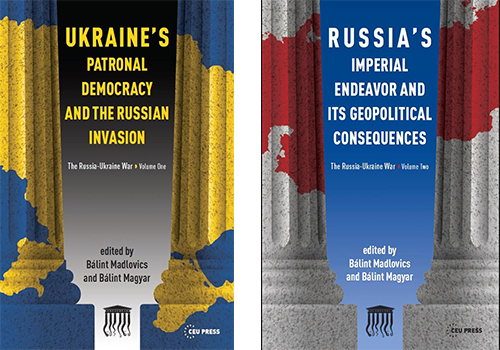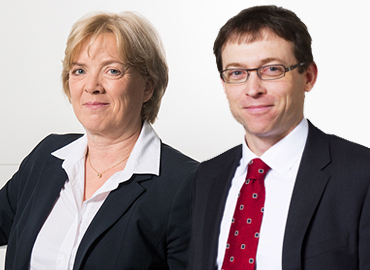This Website uses cookies to improve your visit on our website. More Info
Perspectives Shaping
the Future of Ukraine
- November 15, 2023
- 2:20 - 8:30 pm CET
- Online via MS Teams
Conference Schedule

If you are interested in the topic of our conference in more depth, we would like to recommend two books recently co-edited by our speaker Bálint Madlovics:
The authors of volume one "Ukraine's Patronal Democracy and the Russian Invasion" examine the chances of an anti-patronal transformation after the war. The authors of volume two "Russia's Imperial Endeavor and Its Geopolitical Consequences" examine the main geopolitical consequences of the resurgent imperialist aspirations of the Russian Federation.
Both books can be downloaded free of charge as e-books.
Speakers
Until end-January 2021, he was full Professor in Financial Systems Resilience at Bournemouth University. Formerly President of CASE - Center for Social and Economic Research in Warsaw, Poland, he is a leading scholar on institutional economics in transition. With 20+ years' experience in the public and private sectors around the world, he has advised governments on economic policy issues in Armenia, Azerbaijan, Georgia, Kazakhstan, Moldova, Poland, Russia, Afghanistan, Croatia, Bosnia, Kosovo, and Germany. His previous post before Warsaw was in Moscow, as Head of Global Markets and Institutional Research at the Institute for Emerging Market Studies (based at the Moscow School of Management - SKOLKOVO).
Dr. Hartwell’s research concerns financial economics, transition dynamics, the economics of institutions, and property rights and business environment reforms.
He holds a PhD in Economics from the Warsaw School of Economics and a Master’s in Public Policy from Harvard, as well as BA in Political Science and Economics from the University of Pennsylvania. He is also the author of Institutional Barriers in the Transition to Market: Examining Performance and Divergence in Transition Economies (Palgrave Macmillan, 2013) and Two Roads Diverge: The Transition Experience of Poland and Ukraine (Cambridge University Press, 2016).
Presentation: So Far from God, So Close to Russia: The (Economic) Problem with Being Ukraine
He was the Managing Director of Eutop Consulting Berlin and Brussels between 2017 and 2020, after he retired from a 33-year career in the European Commission and the European Diplomatic service (EEAS). Before his last posting as the EU Ambassador to the Republic of Korea, he was the Director for East Asia and the Pacific, Director for Foreign Policy Strategy and Coordination of the Europe, i.a. EU representative in the UN Alliance of Civilizations and in the Chernobyl donors conference, and the Inspector General of the EEAS. Mr Sabathil was the European Commission’s Representative to Germany (2004-2008), and the Ambassador to Norway and Iceland (2000-2004). Until 2000, he had been the Head of the Division for the Western Balkans, and the Chargé d’Affaires in the Commission’s Delegation in the Czech Republic, Slovakia and the OSCE in Prague (1992-1996), Head of Office of the EU Budget Director General, and member of the Cabinet of the Commission’s Vice President Narjes.
He obtained his Doctorate in Economics from Ludwig-Maximilian University Munich in 1981 and began his career at the German Chamber of Commerce and Industry in Bonn in 1982. Academically he has been a guest Professor at Economic University of Prague since 1996, the College of Europe in Bruges (2010-2015), and the Sichuan University in Chengdu in 2017. He is a board member of several NGOs, and has published articles and books on EU policies. He has dual citizenship of Germany and Hungary.
Presentation: Ukraine – the next new EU member?
She researches multinational corporations and international strategic management, especially in Asian and emerging markets, including business-government relations, innovation, technology development, strategic decision-making, sanctions and subsidies, and the impact of scholarly research, with over 315 publications/presentations in these areas.
Her research has been directly incorporated into federal regulation around the world, and she has provided numerous Congressional testimonies: e.g., she testified before the US Senate on Shuanghui’s takeover of Smithfield Foods, considered the most important case on FDI in a decade; she also testified on federal legislation, the Non-market Economy Trade Remedy Act whose findings were incorporated into US regulation (HR 1229). Her research on Chinese subsidies has supported 3 pieces of anti-dumping regulation in the European Commission.
Presentation: Explaining Corporate Exits from Russia: Do Sanctions & Boycotts Work?
As a consultant with the United Nations, he has significantly contributed to various projects with the UN agencies (UN DESA, USA, FAO Subregional Office, Turkey, UNEP, Canada, and UNDP, Ukraine).
As an educator, he has shared his expertise with North America, Europe, and Asia students. He was a visiting scholar at the Institute for Environmental and Sustainability Communication, University of Lüneburg, Germany, and the Environmental Journalism Program at the Graduate School of Journalism, University of California, Berkeley. For many years, he also served as a journalist in a Ukrainian daily newspaper covering environmental and social issues, including Chornobyl disaster recovery.
He holds a PhD from the National Taras Shevchenko University in Kyiv, Ukraine, and a joint Master’s from Hamburg University, Germany, and Aarhus University, Denmark.
In September, the German Federal Foreign Office invited him to participate in the Diplomacy by Networking Programme in Berlin, Germany, and Brussels, Belgium.
Learn more about Dr. Alexander Belyakov at https://alexbelyakov.com
Pesentation: Perspectives on the Future Relationships between Ukraine and Russia through the Prism of the Sustainable Development Goals
She has 20 years’ experience in sustainability, climate, and resilience project management in the international and Ukrainian organizations. Prior to joining Ramboll Klaudia was a founding partner of Responsible Future Change Agency in Ukraine. For the past 10 years she has been working on sustainability projects with such international organizations as UN Development Program (UNDP) Ukraine, UNDP Accelerators Lab, UN Global Compact network Sweden, Embassy of Denmark in Poland in the areas of Agenda 2030 and SDGs integration, Paris Agreement, circular economy, climate change adaptation, green and just transition. She holds M.A. degree in German, English and Swedish linguistics from Kyiv National Taras Shevchenko University, a diploma from Stockholm Resilience Centre and a diploma from the Swedish Institute Management Program.
Presentation: Green recovery: the role of ESG impact on the future of Ukraine
Presentation: Future of Ukrainian culture – Preserving and promoting Ukrainian national heritage
Dr. Heinz Strubenhoff graduated at Göttingen University and received a PhD from the Technical University (now Humboldt University) in Berlin. He worked more than 40 years in farming, research, consultancy and finance in the private and public sector in Europe, Africa and post- Soviet countries. He is an expert in agricultural economics and supports impact investment, finance and agribusiness for development banks in Africa, (DWS, KfW). He has been project leader of the German-Ukrainian Policy Dialogue in Agriculture. In Ukraine, he supports agriculture and rural development (European Commission and German Government). He volunteers to promote social entrepreneurship (Initiative). His residence experience includes Togo, Ukraine, Moldova and Ethiopia. He has comprehensive working experience in Europe, Africa and the former Soviet Union as a staff member of IFC/World Bank.
Presentation: Impact investing, Agriculture and IT as promising sectors for post-war Ukraine
He had graduated from Cologne University of Applied Sciences where he majored in Agricultural machinery engineering. His work experience includes positions in Germany and Ukraine. In Germany he worked for John Deere, the world largest producer of agricultural and logging equipment. His responsibility was area service management in Ukraine and Kazakhstan. He also set up product service and dealer support in these countries and trained the dealers’ key personnel.
In Ukraine he joined the German-Ukrainian agricultural project of the Federal Ministry of Food, Agriculture and Consumer Protection. Mr. Treis held the position of project manager with the focus on farming consultancy. The goal of the project was to set up a farm consultancy in Ukraine. Later he worked as an independent consultant providing also professional expertise on starting agricultural business in Ukraine. Since 2012 he worked as a CEO of agricultural enterprises.
Interview: Agriculture in Ukraine, how to prepare agricultural businesses for the future, but also: challenges today during war times
He holds an MA in Political Science (2018) from Central European University and BAs in sociology and applied economics. He was a research fellow at the Financial Research Institute in Budapest (2018–2019) and visiting professor at BCE (2022). He has published peer-reviewed articles, book chapters, and books on post-communist regimes since 2015. His most recent books, co-authored by Bálint Magyar, include The Anatomy of Post-Communist Regimes (CEU Press, 2020), A Concise Field Guide to Post-Communist Regimes (CEU Press, 2022), and a two-volume collection of studies on Ukraine’s Patronal Democracy and Russia’s Imperial Endeavor (CEU Press, 2023).
Presentation: Ukrainian Regime Cycles and the Russian Invasion
Gabriella Maráz has a PhD in General Linguistics and Intercultural Communication from Ludwig-Maximilians-University, Munich, Germany.
In 2022, he was awarded Researcher of the Year with colleague Prof. Dr. Eva Stumpfegger. He is currently involved in case studies on diversity and the Dominican Republic, and his current research is focused on learning (online learning, technology acceptance, integration through social service), digital onboarding, and sustainability.
He earned degrees from five universities, among others two MBAs - from the University of South Carolina and Aalto University in Finland. He obtained his doctorate at the LMU in Munich on the topic of “Knowledge Transfer in eLearning”. His professional career includes positions in asset management and the real estate business in Florida, USA. Since 2002, Prof. Weilage has been teaching in Germany. He has been a member of Munich Business School since 2007.
